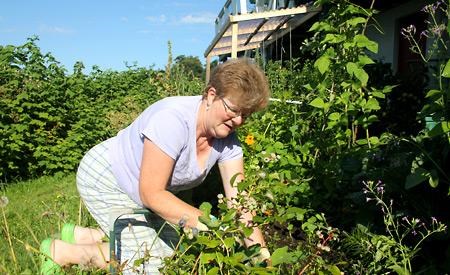Gardens all around the region will showcase both their carrots and creativeness Sunday, August 5, as the fourth annual Edible Garden Tour takes to the streets. The event features seaside plots to working farms and aims to show people different approaches to growing food sustainably.
The tour, which for the first time will have a focus on gardens south of town, is a collaboration between Powell River Food Security Project and Transition Town Powell River (TTPR). It is held in conjunction with the 50-Mile Eat Local Challenge, a 50-day challenge encouraging people to eat locally-grown food.
The tour will feature five gardens south of town, which can be visited any time between 9 am and noon, and six gardens within city limits, which can be visited between 2 and 5 pm.
“As long as you visit morning gardens in the morning and afternoon gardens in the afternoon, you’re fine,” explained the event’s coordinator, David Parkinson.
There will also be an opportunity to donate at each garden, with proceeds going toward future food-centred events.
A guidebook, which includes maps and driving instructions for the self-guided tour, is available online to download at food security and transition town websites. There are also paper copies at Kingfisher Used Books and Black Point Store.
Featured in the guidebook are clues for a food literacy treasure hunt, organized by Powell River Literacy Council. Participants can fill out the answers to the clues and drop it off at the nearest garden to have a chance to win a $50-gift certificate from Sunshine Organics/Ecossentials, a $25-gift certificate from Breakwater Books and Coffee, or a free Good Food box.
Parkinson explained that the aim of the tour isn’t to showcase perfect plots, but to show resourcefulness and creativity. “The main purpose of the Edible Garden Tour is to really show people what other people are doing to grow food, so it was never about the most beautiful, spectacular garden,” he said, adding that they try to mix up the styles and sizes of the gardens, as well as the challenges the gardeners face.
Surprisingly, with over a hundred people coming through their yard and sharing tips and tricks, Parkinson said it’s often the gardeners who benefit the most. “The one thing we’ve found over the last three years is that the gardeners actually learn more than the people on the tour sometimes,” he said.
Kevin Wilson, president of TTPR and co-organiser of the tour, agreed events such as this are good for helping people produce food sustainably. Through email, he said the garden tour was a great way to “get inspired to dig in the soil and grow more food for yourself.”
He added the event is a great teaching tool, because it provides hands-on experience and real-life answers. Wilson ended with a sage piece of advice. “Reading about growing food is useful—but seeing it done live and in person is usable.”



